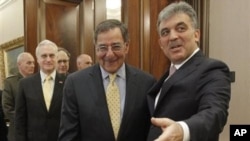The U.S. defense secretary heads to Libya on Saturday, becoming the first American defense chief to visit the country. Leon Panetta plans to offer Libya's interim leaders Washington's support for their efforts to transition the country to democratic rule. Our correspondent is traveling with the defense secretary and has this report from Ankara.
Defense Secretary Leon Panetta visits Libya months after a popular rebellion assisted by the U.S. and NATO drove out longtime ruler Muammar Qadhafi. He says he is going to get a first-hand look at the situation after the revolution and pay tribute to those who carried it out.
Libya's new leaders have been working to bring together factions and forge institutions, including an army, but that effort is proving difficult.
A recent gunbattle between army troops and members of a militia near the Tripoli airport and other violence raised questions of whether the country is able to transition to a stable democracy any time soon.
On the eve of his visit to Tripoli, Panetta told reporters in the Turkish capital he has confidence that transition will happen.
"There are going to be challenges here," said Panetta. "There are going to be difficulties, but I think any country like Libya that was able to do what they did and show the courage that they did in making the changes that took place there, I'm confident that ultimately they're going to be able to succeed in putting a democracy together."
The defense chief said Washington is ready to offer assistance to Libya's new leaders, but only if and when they request it. He cautioned against giving the appearance that the United States is trying to dictate how Libya should set up its new government.
"The last thing you want to do is to try to impose something on a country that has just gone through what the Libyans have gone through," he said. "They have earned the right to try to determine their future.”
Panetta said a transition will take time.
"They are working through some very difficult issues to try to bring that country together. It's not going to be easy," he said. "This is tough. This is not a country that has a tradition of democratic institutions and representative government. This is going to take some work but the indications I have that they are making progress trying to bring the tribes together, trying to bring the country together in order to establish the institutions that must be put in place so that the Libyan people will have the opportunity to have elections, to have representative government. "
Panetta's stop in Tripoli comes after he briefly stopped Baghdad briefly this week to mark the formal end to the U.S. war in Iraq. He also visited Afghanistan, where he said the U.S. Is winning the war on extremists.
On Friday, Panetta met with Turkish officials and discussed the need for the international community to pressure Syria's leadership to - in his words - “do the right thing” by allowing democratic change and an end to human rights abuses.
He also praised Turkey - a member of NATO - for allowing the installation of a NATO missile defense radar system on its territory. The system, designed by the U.S., is part of a shield to guard NATO countries against a missile attack from Iran.
Panetta Offers US Support for Libya's Transition to Democratic Rule
- By Luis Ramirez




